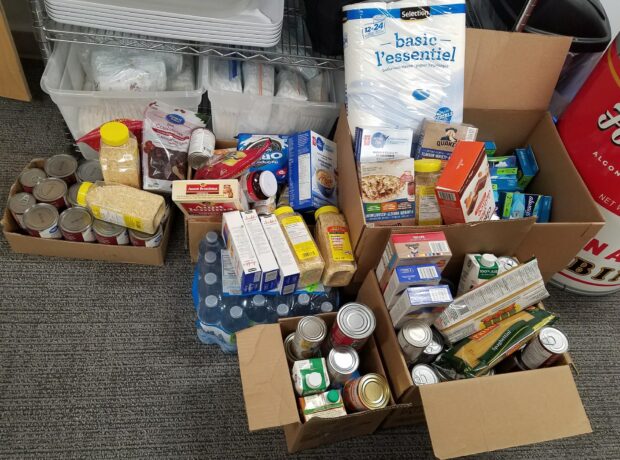There are students at Algonquin who struggle to afford groceries, so they have to find alternative ways to get what they need.
The Students’ Association Food Cupboard helped 60 students during the month of September alone, according to the service’s coordinator, Jessica Clark.
“This is still a significant amount for the first month considering not all students are aware the service is available since they are not able to come to campus,” Clark said.
The Food Cupboard is a confidential service available to current, on-campus students. By applying for support, students can receive food and hygiene items once a month or on an emergency basis.
“There are so many students that are reaching out right now and a lot of them lost their jobs, were laid-off or can’t find a job,” Clark said. “They are stuck.”
Roger Crosby, a business management and entrepreneurship student, is one of the students coming forward for help. He has received support from the Food Cupboard since he started his studies at Algonquin in 2018.
“I’ve lived in poverty all my life,” he explained. “I’ve lived on food banks all my life both as a customer and as a volunteer. Going to the food bank at school was a natural extension of that.”
Since Crosby is not attending classes on campus, he receives a $50 Walmart gift card once a month, which allows him to get fresh produce. “That alone keeps me in potatoes, onions and vegetables. I have potatoes for the whole month now.”
Due to the pandemic, Crosby has had to spend money on personal protective equipment, making support from the Food Cupboard even more important for him. “Like everybody else, I’ve had to buy PPEs and there is a lot of price gauging going on.” He described checking Amazon regularly to avoid paying anywhere from $350 to $400 for a case of gloves.
The damaging effects of the pandemic are not the only thing playing a role in the increase of students having trouble accessing food.
According to Canada’s Food Price Report 2020, overall food prices were predicted to have increased by two to four per cent over the year. For the average family, the annual cost of food is $12,667, a $487 increase from 2019.

To increase donations, the Food Cupboard organized the service’s first contactless food drive outside of C-Building on Oct. 1. The event brought in 147 non-perishable food items and $450 in monetary donations both at the event and through their online donation portal.
Clark explained that with the number of COVID-19 cases rising locally and the possibility of fewer people coming out to donate face-to-face, the goal is to gain exposure. “It’s more to kind of just get us out there, and I guess more visible to people,” she said.
Clark explained that the rise in demand from students is not a new issue.
Over the summer months, the Food Cupboard saw twice the number of students needing food supplies than usual.
“We would see, on average, 60 students this summer,” Clark explained about monthly demands. “Usually, I may see 30.”
Although there is a much lower percentage of students physically on campus, the SA said its commitment to the service remains.
In her September address, SA President Emily Ferguson spoke at length about the essential nature of the service.
“If you require food but are in isolation or are not comfortable visiting in person, virtual options are available,” Ferguson wrote. “The SA, and our Food Cupboard, are dedicated to continuing to help students. Now, more than ever, we need the support of the Algonquin College community.”
Crosby’s advice for students in need is to contact the Food Cupboard and talk to its helpful staff. “Jessica is amazing,” he added. “You can tell she cares; she tries really hard. Just go down and talk to her.”
The Food Cupboard is available to students by appointment only on Mondays and Wednesdays.
The service offers referrals to community food banks for off-campus students.


